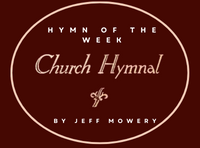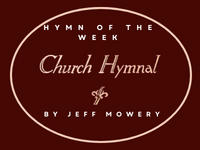You Never Mentioned Him To Me
WHEN IN THE BETTER LAND, BEFORE THE BAR WE STAND
HOW DEEPLY GRIEVED OUR SOULS WILL BE
IF ANY LOST ONE THERE, SHOULD CRY IN DEEP DESPAIR
“YOU NEVER MENTIONED HIM TO ME.”
O LET US SPREAD THE WORD, WHEREEVER IT MAY BE HEARD
HELP GROPING SOULS THE LIGHT TO SEE
THAT YONDER NONE MAY SAY, “YOU SHOWED ME NOT THE WAY.
YOU NEVER MENTIONED HIM TO ME .”
A FEW SWEET WORDS MAY GUIDE, A LOST ONE TO HIS SIDE
OR TURN SAD EYES ON CALVARY
SO WORK AS DAYS GO BY, THAT YONDER NONE MAY CRY
“YOU NEVER MENTIONED HIM TO ME.”
CHORUS
YOU NEVER MENTIONED HIM TO ME
NOR HELP ME THE LIGHT TO SEE
YOU MET ME DAY BY DAY AND KNEW I WAS ASTRAY
YOU NEVER MENTIONED HIM TO ME
One of the things I like most about hymns is the variety of music styles and the variety of feelings one gets while singing a hymn. A hymn like “A Mighty Fortress is our God” has a majestic feel, and I love to hear it with a full orchestra. Some hymns have an upbeat, happy rhythm to them (“Wonderful Grace of Jesus”) while others have a calming, soothing tone to them (“Peace, Peace, Wonderful Peace”). I will tell you on the front end that the hymn that I have chosen to do this week is not an uplifting, tap-your-toe, kind of hymn. It is not likely to make you smile or laugh. It is not likely to bring “happy thoughts” as many other hymns often do. The hymn’s message is a rather sobering message, but one that is powerful, and I hope the words of the hymn will cause you to think. I found this particular hymn in the “Red Back” hymnal, but I can honestly tell you that I have never sung it nor heard it sung in Church before. After you read the words, you will probably understand why.
For those theologians who might be reading this hymn, you may take issue with the basic premise of this song. The idea that each of us will stand before God’s judgment, and will hear others speaking to us about what we did or did not do while on earth. I am not interested in debating whether or not the author’s idea is theologically accurate or not. I am sure there would be lively discussion on what will actually happen in Heaven, but I do think the author of this hymn does an excellent job of bringing up an important question for all of us – Are we telling sinners about the grace and mercy of God?
Couple of comments about certain lines in the song:
- “Help groping souls” – Do you see people struggling in life? Are there people you know searching for happiness in material things, in their work, or in their hobbies? We all know people that are grasping or groping for something. To “grope” means “to search blindly or uncertainly.” Do you know anyone searching blindly or uncertainly in this world? This hymn reminds us that we have the answer to what they are searching for. We know the person that can satisfy their soul. We can and should point them to the Cross.
- “Knew I was astray” – There is a fine line between honestly assessing someone’s spiritual condition and standing in judgment over their soul, and unfortunately that line is many times crossed. People can be more interested in condemnation and pointing out someone’s sin than truly be concerned over their soul. We do, however, know of people in our lives that are “astray.” Folks that don’t know the Lord, and unless they believe on the Lord Jesus Christ, they won’t be saved. That is a sobering thought, but a reminder for all of us of the importance of telling the good news to others.
I will be the first to tell you that I struggle sometimes with the English language, so I am probably the last person to comment on a foreign language. But there is an interesting thing I learned in Spanish. Many times when you say “Gracias” to someone in Spanish, that person will respond by saying “De nada” which literally “It is nothing” or “It was nothing.” At first glance, that seems like an odd response to “Thank you,” but I think the meaning of the phrase is essentially – “What I did for you wasn’t a big deal, so don’t worry about it – It was nothing.” We, too, have a response that is similar to “De nada” in English – “Don’t mention it.” We will tell somebody “Don’t mention it” when what we have done for them wasn’t a big deal, was insignificant, or didn’t cost us anything.
The hymn this week is a reminder that there is something great that was done for all of us. Something significant. Something that cost a tremendous price. It is a Big Deal. Something worth mentioning to others. So I hope that you will take the time to reflect on the words of this hymn, and think about someone you know (a neighbor, a family member, a co-worker) that is “astray,” and “mention Him” to them. Not with a “brow-beating” accusatory tone. But with a “sweet” word about a saving Lord. It is definitely worth mentioning.

